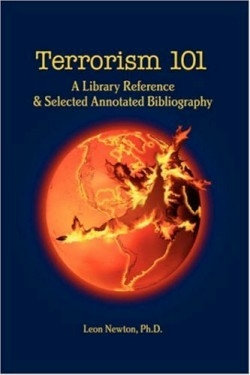
Terrorism 101
Library Reference & Selected Annotated Bibliography
While many people like to think that terrorism is a new phenomenon it is only new in the sense that America and American interests have become targets. In other parts of the world terrorism has been a fact of life for centuries.
Leon Newton a professor of political science at Jackson State University offers a brief history of terrorism and the current challenges faced by those nations that would seek to eradicate it in his book Terrorism 101.* This quick read is obviously anti-Bush administration but still provides insight into the motivations of terrorists and how they can best be fought.
The West’s misguided and dangerous emphasis on eradicating [Osama] bin Laden and his immediate circle wastes time effort and money that would be more valuably spent in trying to look past the secular worldview to understand all Muslims—not just the extremists—to better understand bin Laden’s appeal.
Though Newton’s arguments are sometimes repetitive his book offers the kind of general overview that would serve a layperson well. Those looking for more information about the history of terrorism the mindset of current terrorists the threats on civil liberties made by lawmakers seeking to hunt down terrorists and other issues can consult the annotated bibliography that makes up more than half of this volume.
The bibliography does not always make sense however. The works cited in the book should have been separated from the annotated bibliography or at least the subject matter of the books articles and websites should have been separated so a researcher searching for information about al Qaeda and someone also looking for citations about the PATRIOT Act could find them without sorting through every entry. If this book were truly meant to be a library reference as the title states the author would have done well to make the work more user-friendly — adding an index for instance.
Still a reader looking for an easy-to-read reference that will get him or her up to speed quickly about the nature of modern terrorism will find Terrorism 101* more than useful and students writing on subjects such as terrorism and civil liberties may also find the bibliography helpful in their research. This is not a deep study that delves into the minds of terrorists nor offers deep solutions to their threat but it can help lay readers understand what terrorism is where al Qaeda came from and how different nations and organizations have responded to new threats.
Reviewed by
Sarah White
Disclosure: This article is not an endorsement, but a review. The publisher of this book provided free copies of the book and paid a small fee to have their book reviewed by a professional reviewer. Foreword Reviews and Clarion Reviews make no guarantee that the publisher will receive a positive review. Foreword Magazine, Inc. is disclosing this in accordance with the Federal Trade Commission’s 16 CFR, Part 255.
